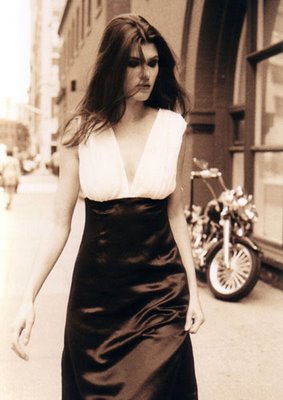
SEGMENT: "If that weren't enough to break the tree-hugging stereotypes, well-respected names like Diane von Furstenberg and Marc Jacobs are also adding eco-fashion to their collections, and there's even couture eco-fashion, courtesy of designer Linda Loudermilk.
That, and the fact that celebrities like Bono (who represents the Edun clothing line), Darryl Hannah, and model Summer Rayne Oakes are lending their faces to the cause, has made wearing eco-friendly clothes as cool as Kabbalah..."
Image: Summer Rayne in silk-hemp dress by coolnotcruel
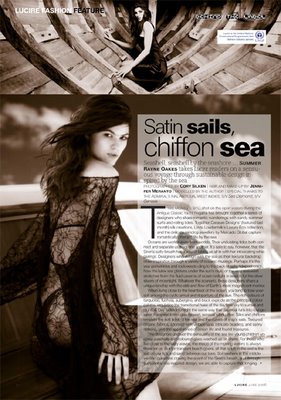

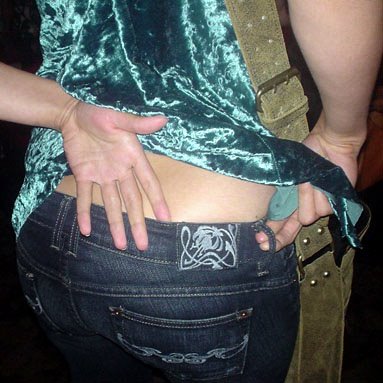 (This is your ass in Del Forte organic denim jeans (well, actually, it's my ass in Del Forte).... (but that is besides the point)...This is your ass (below) NOT in Del Forte jeans). Image
(This is your ass in Del Forte organic denim jeans (well, actually, it's my ass in Del Forte).... (but that is besides the point)...This is your ass (below) NOT in Del Forte jeans). Imagecompliments of my friend Rem who likes to take pictures of girl's asses.
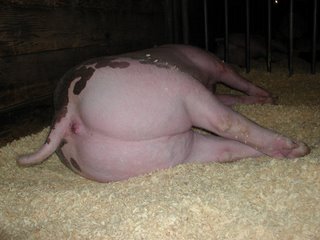
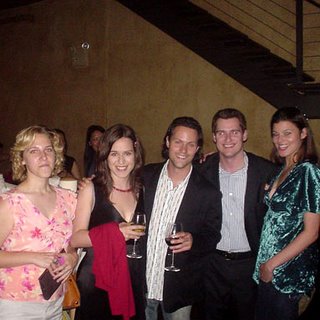 (Above: new writer for Treehugger I'm sorry I don't remember your name!, Kyeann, Jeremy, Shane of Design Tex, and me. Below: don't spook him. You may mess up his brain waves).
(Above: new writer for Treehugger I'm sorry I don't remember your name!, Kyeann, Jeremy, Shane of Design Tex, and me. Below: don't spook him. You may mess up his brain waves). 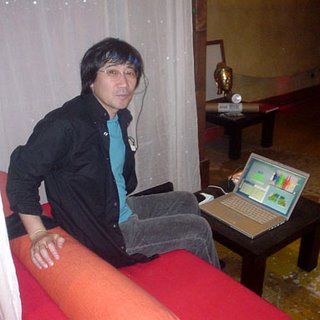

The May Edition of "Behind the Label" features Carasan Designs. Check out the full editorial either in pdf or html at www.behindthelabel.net - May 2006 in "What's New" Section.

pants by Deity Aton, and a recycled detergent bag by XS Project)
Sweet Summer Rayne: Talks Life and Ecofashion with Jack Yan
Published Tuesday, June 20, 2006 by SROmgmt.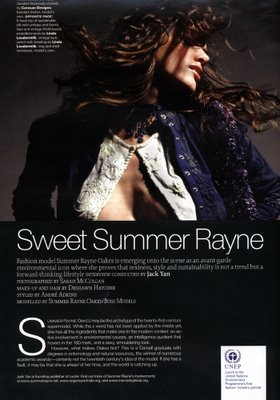

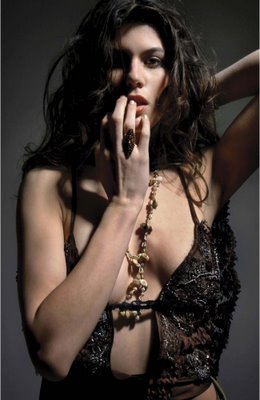
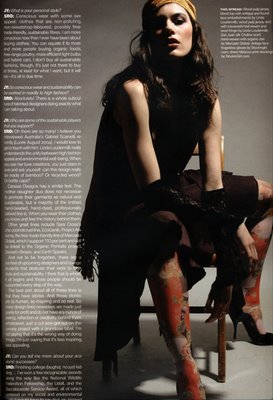
SWEET SUMMER RAYNE
Fashion Model Summer Rayne Oakes is emerging onto the scene as an avant-garade environmental icon where she proves that sexiness, style and sustainability is not a trend, but a forward-thinking lifestyle.
photographs SARAH MCCOLGAN | styled by ANDRE ADKINS | makeup-hair DESHAWN HATCHER clothes LINDA LOUDERMILK, PROJECT ALABAMA, MERCADO GLOBAL, CARASAN
Summer Rayne Oakes may be the archetype of the twenty-first century supermodel. While the "s" word has not been applied by the media yet, she has all the ingredients that make one in the modern context: an active involvement in environmental causes, an intelligence quotient that hoves in the 180 mark, and a sexy, smouldering look.
However, what makes Oakes tick? This is a Cornell graduate with degrees in entomology and natural resources, the winner of numerous academic awards - certainly not the twentieth century's idea of the model. If she has a fault, it may be that she is ahead of her time, and the world is catching up.
Jack Yan: How do you see your modeling career lift the profile of the causes you are involved in?
Summer Rayne Oakes: The glamorous appeal that surrounds modeling really helps target a wider and more varied audience for the causes that I am associated with; environmentalism and humanitarian issues are hot topics all the time, but usually within certain cliques. My image is the primary draw for most viewers, but I’ve received an inordinate amount of mail from individuals who inadvertently learn about my work and can relate to it, are interested in it, or are inspired by it; it’s really energizing to hear what they have to say. You don’t always get that appeal and response from general audiences to traditional activism. I think it’s a viable way to engage outside groups.
A majority of my work, like John Cooper’s Organic Portraits project, Mercado Global, sustainable fashion outreach, and my media ventures are all linked to fashion in a major way, so just being in the industry is a plus. I’ve met a good number of people who are involved in similar endeavors and many of them are at least within 3 degrees of someone who can contribute to a cause in a substantial way.
JY: You’ve spoken about how you’ve been hooked into environmental science and entomology, but how did you get started in modeling? Was a connection ever apparent that being a model could help a cause?
SRO: It all started my sophomore year of college. I found myself getting a bit disenchanted by “the system.” Professors and students were encouraged to think outside the box, but in the end, most of the time it came down to how many papers you can get into scientific journals, which isn’t always the best venue for engaging citizens who don’t read that stuff. Don’t get me wrong though, I definitely loved college, everyone was so supportive, and it’s an experience that I would do all over again.
I did, however, begin asking myself if I could do more. I became fascinated how celebrities and models could make such a difference in the world if they wanted to and the fashion industry was mighty appealing to me. I wanted to experience that and I wanted it badly. I started with an agency in
JY: Did you have to travel more?
SRO: Yeah, I began getting enough work to travel nearly every week from college to
JY: What is your personal style?
SRO: Conscious wear with some sex appeal: clothes that are non-polluting, non-sweatshop labored, possibly fair-trade friendly, sustainable fibers. I am more conscious now than I ever have been about buying clothes. You can equate it to more and more people buying organic foods, free-range poultry, more efficient light bulbs and hybrid cars. I don’t buy all sustainable fashions, though, it’s just not there to buy at times, at least for what I want, but it will be – it’s all in due time.
JY: So conscious wear and sustainability can be worked in readily to high fashion?
SRO: Absolutely! There is a whole subculture of talented designers doing exactly what I am talking about.
JY: Who are some of the sustainable players that you support?
SRO: Oh there are so many! I believe you interviewed
Carasan Designs has a similar feel. The mother-daughter duo does not necessarily promote their garments as natural and sustainable, but a majority of the knitted, hand-beaded, hand-dyed, professionally tailored line is. When you wear their clothes, you know and feel the history behind them.
Other great lines include, Sara Cross’s chic coolnotcruel line, EcoGanik, Project Alabama, the fair-trade friendly line of Mercado Global, which I support 110% and will be linked to the Organic Portraits project, Stewart+Brown, and Earth Speaks.
And not to be forgotten, there are a number of upcoming designers and college students that dedicate their work to high style and sustainability. I think that is where it all begins and those people should be supported every step of the way.
The best part about all of these lines is that they have stories. And those stories are so human, so inspiring and so real. So many design lines nowadays are made just purely for profit and do not have any ounce of feeling, reflection or credibility behind them whatsoever, just a cut-sew-get-out-on-the-runway project with a grandiose label. I’m not saying that it’s the wrong way of doing things; I’m just saying that it’s less inspiring, less appealing.
JY: Can you tell me more about your academic successes?
SRO: Finishing college (laughs); no just kidding…I’ve won a few recognizable awards along the way like the National Wildlife Federation Fellowship, the Udall, and the Baccalaureate Service Award, all of which centered on my social and environmental work. I would have to say that my biggest successes, though, was allowing myself to be inspired by a number of people and in return inspiring them. That’s the greatest form of shared success that I can think of.
JY: The environment has been a trendy topic lately, but how can we create a positive change in the finance-obsessed culture of corporations? I know I’ve got to the age where I’ve seen the first “cycle” and the foundation hasn’t changed much…
SRO: I haven’t been in this industry too long, but from what I’ve seen is that it does come down to the bottom-line, so you have to liberally appeal to that. An idea has to be marketable and profitable and appealing all at the same time, and that is undoubtedly a challenge. With that in mind, you also have to break down the monster of finance-obsessed corporate culture; you have to realize that individuals make up that culture, and many times there is at least one individual within that culture that “gets it.” It’s like trying to find a needle in a haystack, but that one person, if s/he is in the appropriate position, may listen and may be able to make some type of a difference within that company. For instance, I’m working with a cable channel distributor and they have decided to create a more sustainable-lifestyle oriented channel. It was essentially one or two people within the corporation who noticed that consumers are beginning to care about value-oriented initiatives and that starting a channel surrounding those issues can also be profitable. It’s strange to see how everyone views new concepts as major risks, but then when they see these “risks” being put into practice, a vast portion of the world wonders why it wasn’t done sooner.
JY: So companies can be persuaded to adopt socially responsible policies without sacrificing their return to shareholders, as long as the bottom line is kept within their sites?
SRO: For the most part. But companies that were founded on value-oriented initiatives or companies that have later integrated that into their missions are naturally more understanding. They believe in community engagement. And conscious consumers prefer to see some magnitude of giving back to the world – it gives a face to a corporation and humanizes it a bit.
JY: Thanks for your time Summer Rayne.
SRO: Thank you, Jack. It was a pleasure.
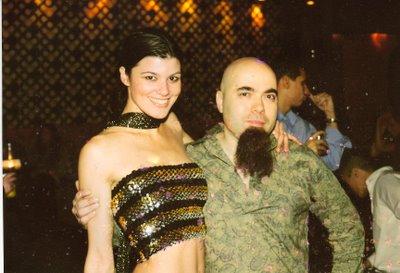



Revisiting the insect-inspired photoshoot with Derek Frampton-Davis and corresponding entophilic article for SASS Magazine.



Okay, so I admit I'm fascinated by my six-legged creatures, but I don't think I'd ever get out my glue stick and Swavorski crystals to emblazon my little beasts. After all, who wants a bug that biomimics the cell phones toted by the likes of Lohan and Hilton? And after you raise these affable "little" creatures, you just couldn't imagine turning your 'gascar into a garish gewgaw.
Bugs in general get a bad wrap. But once you get past your fears of creepy crawlies and really look at them, you can't help but have a curious admiration for what they are. Photographer Jeremy Frechette captured the "beauty" of my first roach: Hercules. When Henry Alex Rubin, friend and director of the movie Murderball dropped me off at home from a late night scooter ride, he came in to see my cockroach collection and exclaimed, "They look like varnished wood!" My sentiments exactly.
Cockroaches aren't THAT bad, but for jewelry?


TRACKBACK: German GQ outtakes (Photog: H. Kinley). Pieces by Carasan Designs, StockinGirl, and Wolford Lingerie.




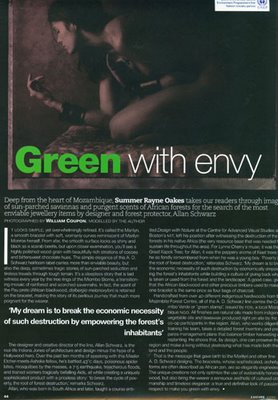
Trackback: April 2006, Lucire Magazine


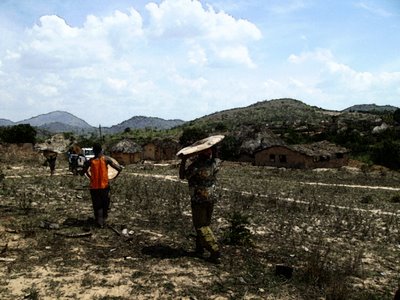
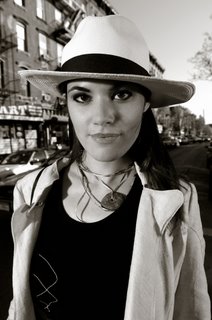
Hat: Pachacuti | shirt: organic cotton "Water is a Human Right" by Linda Loudermilk | Hemp hand-embroidered Xerces Blue Buttefly jacket with vintage fabric by Tara Lynn (5% of profits go to Xerces Society | Organic Cotton jeans by Loomstate | sustainable hardwood bracelets by a.d. schwarz | laptop bag made out of toothpaste and juicebox containers, X.S. Project Group | Necklace: natural stone found in upstate New York with ribbon tie
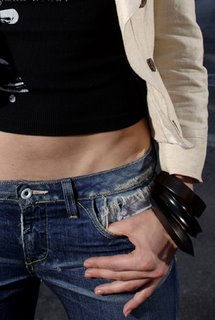
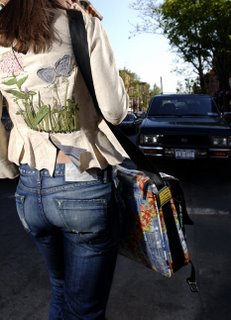
 Summer Rayne spoke with Josh Dorfman on the Lazy Environmentalist live on Sirius Satellite Radio 114 and Lime.com. Hear the talks she had back in July 2005 <here> and more recently in May 2006 alongside Scott Hahn, President of Loomstate <here>.
Summer Rayne spoke with Josh Dorfman on the Lazy Environmentalist live on Sirius Satellite Radio 114 and Lime.com. Hear the talks she had back in July 2005 <here> and more recently in May 2006 alongside Scott Hahn, President of Loomstate <here>.
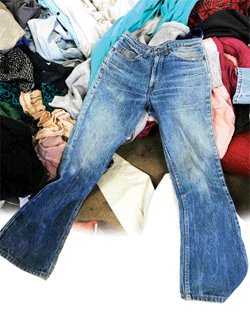 The Monitor. May 27,2006 . Green Fashion -- High couture and eco-friendly styles aren’t necessarily at odds. By Paige Lauren Deiner
The Monitor. May 27,2006 . Green Fashion -- High couture and eco-friendly styles aren’t necessarily at odds. By Paige Lauren DeinerEcofashion proponents encourage people to look at the entire production chain from who grows the materials, to who weaves it, sews it, ships it, sells it and then after it’s purchased how its cleaned and what’s done with it. During every link of that chain people should ask themselves whether the most environmentally friendly and ethical practices were used, said Summer Rayne Oakes, a New York City based activist and entrepreneur. Read on.


G-Think
Josh Dorfman, founder and CEO of Vivavi mentions Summer Rayne, fellow principal of co-founded company, ici on g-think "Doing Good and Being Cool Too: A New Breed of Eco-Entrepreneurs Enters the Marketplace"
g-think: Do you agree there’s a new generation of green celebrities out there, and who do you think are the rising stars?
j.d.: Summer Rayne Oakes is also a rising star. Not only is she a super-hot eco -model, eco-fashion, and fair-trade spokesperson and budding TV personality, but she’s also a total science geek and understands the complex issues surrounding sustainability and how to brand effectively in the industry better than just about anyone else I’ve met.
about
- From the frontlines: Tracking the latest news, updates, and projects of Summer Rayne Oakes
last posts
- Launched New Site and Don't miss THIS conference c...
- We're Moving
- Financial Times Germany Talks Sustainable Style
- Summer Rayne talks Planet Green, Green-Collar Jobs...
- Hometown Paper Highlights Career
- Two Dozen Long Stem Roses
- Sustainable Style: Trend or Movement? What do Stud...
- Behind-the-scenes at LOHAS
- Funniest Response to my Insect Terrariums
- Welcome to 21 new additions to the family
archives
- March 2006
- April 2006
- May 2006
- June 2006
- July 2006
- August 2006
- September 2006
- October 2006
- November 2006
- December 2006
- January 2007
- February 2007
- March 2007
- April 2007
- May 2007
- June 2007
- July 2007
- August 2007
- September 2007
- October 2007
- November 2007
- December 2007
- January 2008
- February 2008
- March 2008
- April 2008
- May 2008
- June 2008
- July 2008
- August 2008
eco fashion sustainable style ecofashion green fashion eco style sustainable design fair trade Summer Rayne Oakes global warming climate change youtube myspace eco organic green balance health wellness environment fashion fashion trends planet style fashion week












